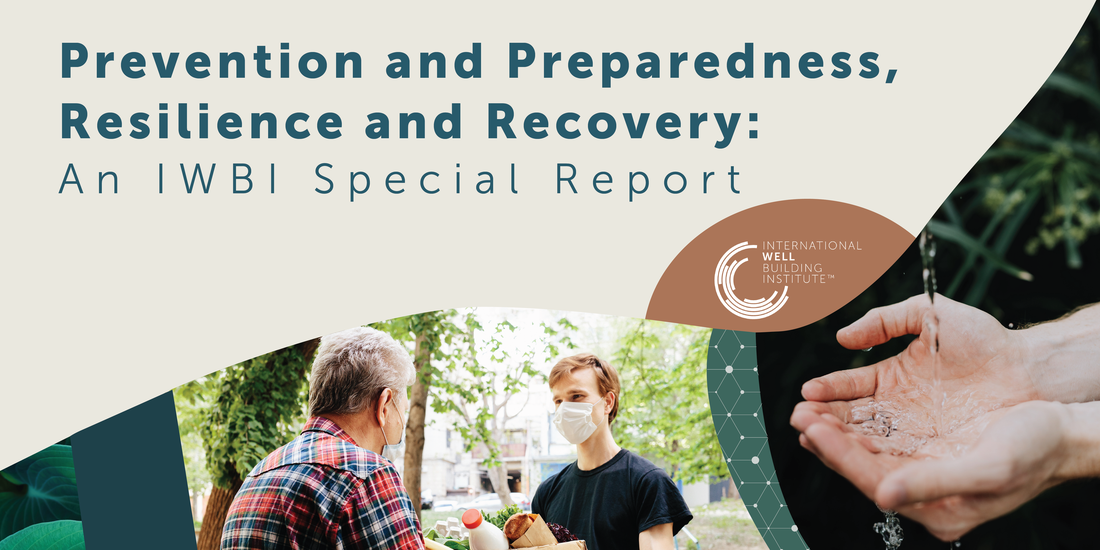by Brianna Crandall — November 15, 2021 — The International WELL Building Institute (IWBI), administrator of the WELL Building Standard (WELL), recently released an in-depth report that lays out research approaches and specific operational strategies as well as policy and investment considerations as the world continues to respond to the Covid-19 pandemic and prepares for acute health threats in the future.
 Prevention and Preparedness, Resilience and Recovery: An IWBI Special Report is a culminating resource of IWBI’s Task Force on Covid-19 and Other Respiratory Infections. This multidisciplinary report integrates proven strategies from the WELL Building Standard (WELL) and actionable insights garnered from IWBI staff and nearly 600 Task Force members.
Prevention and Preparedness, Resilience and Recovery: An IWBI Special Report is a culminating resource of IWBI’s Task Force on Covid-19 and Other Respiratory Infections. This multidisciplinary report integrates proven strategies from the WELL Building Standard (WELL) and actionable insights garnered from IWBI staff and nearly 600 Task Force members.
The report lays out a holistic foundation for action by aligning four core areas deemed central to charting an equitable recovery: translating research to practice; identifying strategies from WELL that support prevention and preparedness, resilience and recovery; reimagining the policy framework to ignite progress in key areas; and advocating for the critical importance of investing for health, including identifying, tracking and reporting on social and human capital metrics. The report also provides specific expert perspectives across nearly two dozen market sectors, professions and geographic regions.
Rachel Hodgdon, president and CEO, IWBI, stated:
The Covid-19 crisis has created challenges that have required unprecedented levels of knowledge sharing and broad-scale expertise. We brought together a diverse group of leaders from around the world to contribute their ideas, experience and perspectives to help us all get back to business with confidence. This collection of strategies, insights and recommendations for a people-first approach to recovery and resilience underscores, once again, that health is a human right.
On March 31, 2020, the Task Force on Covid-19 was convened under the leadership of 16 globally renowned co-chairs, including the 17th U.S. Surgeon General Dr. Richard Carmona; Dr. Risa Lavizzo-Mourey, former head of the Robert Wood Johnson Foundation; Dr. Wang Yu, former Director General of the Chinese Center for Disease Control and Prevention; Dr. Joseph G. Allen, director of the Healthy Buildings program and an associate professor at Harvard’s T. H. Chan School of Public Health; and other key business and public health leaders.
Nearly 600 volunteers — epidemiologists, infectious disease specialists, public health researchers, real estate professionals, facilities managers, designers, architects and engineers, among hosts of others — contributed their time and expertise to the Task Force. Their thoughtful input helped shape the report’s focus not only on physical health, well-being and safety, but also mental health, sustainability and a more just society in the recovery from the global pandemic.
The report covers:
- The critical importance of air and water quality; emergency preparedness; ergonomics and remote work; immune system strengthening; mental resilience; community resilience and support for workers as they return to the office
- The shifting needs for office design in the future
- The changing landscape of public health, considering architects, designers and engineers as a part of the public health ecosystem
- How the growing prominence of well-being in commercial real estate impacts our future
- The duality of sustainability for people and planet
- The impact of the pandemic on health equity, with a focus on supporting vulnerable communities in our recovery
- What to expect and how to implement changes across healthcare, schools and universities, senior living, airports, hotels and hospitality, sports venues and more.
Jason Hartke, IWBI’s EVP, External Affairs, and one of the report’s lead authors, commented:
We’re immensely proud of this special report because of its scope, vision and quality of content. The 300+ pages worth of content have been continually revised as the research has expanded and evolved and the pandemic’s impacts have ebbed and surged across the globe over the past months. But it’s also a tremendous example of IWBI’s ethic of co-creation with our community. Nearly 40 IWBI staff members served as the subject matter expert authors. They sourced input from more than 700 leading studies, publications and resources and drew insights from leading professionals hailing from over 30 countries and more than a dozen unique industries. It’s a remarkable achievement.
The Task Force also provided input during a review of WELL undertaken through the lens of the pandemic, and noted that, by relying on the research and focusing on the fundamentals of public health and building science, WELL already offered many of the strategies so many were seeking for slowing the transmission of Covid-19 and other airborne diseases.
In response to requests from customers asking for a WELL designation to meet the moment, one that would address acute health threats in indoor spaces, Covid-19 especially, through shifts in building operations and corporate policies, IWBI extracted features from the WELL Building Standard to create a new offering, the WELL Health-Safety Rating. IWBI launched this evidence-based, third-party-verified rating in June 2020. Today, almost 2 billion square feet of real estate are enrolled — from the iconic Empire State Building to Yankee Stadium and across entire organizations, including Fairfax County Public Schools, JPMorgan Chase, Citi, T-Mobile and Brookfield, among many others.
Hodgdon added:
We are enormously grateful to our Task Force members for the time and expertise they have contributed to these critical efforts. If there is one thing the pandemic has taught us, it is that we don’t know what’s around the corner and that it takes all of us working together to meet the challenges head on. We approach this complex path to recovery with hope, knowing this contribution from the IWBI community can play an important part in achieving health and well-being for everyone, everywhere.
Prevention and Preparedness, Resilience and Recovery: An IWBI Special Report is available to access from the IWBI/WELL website.




